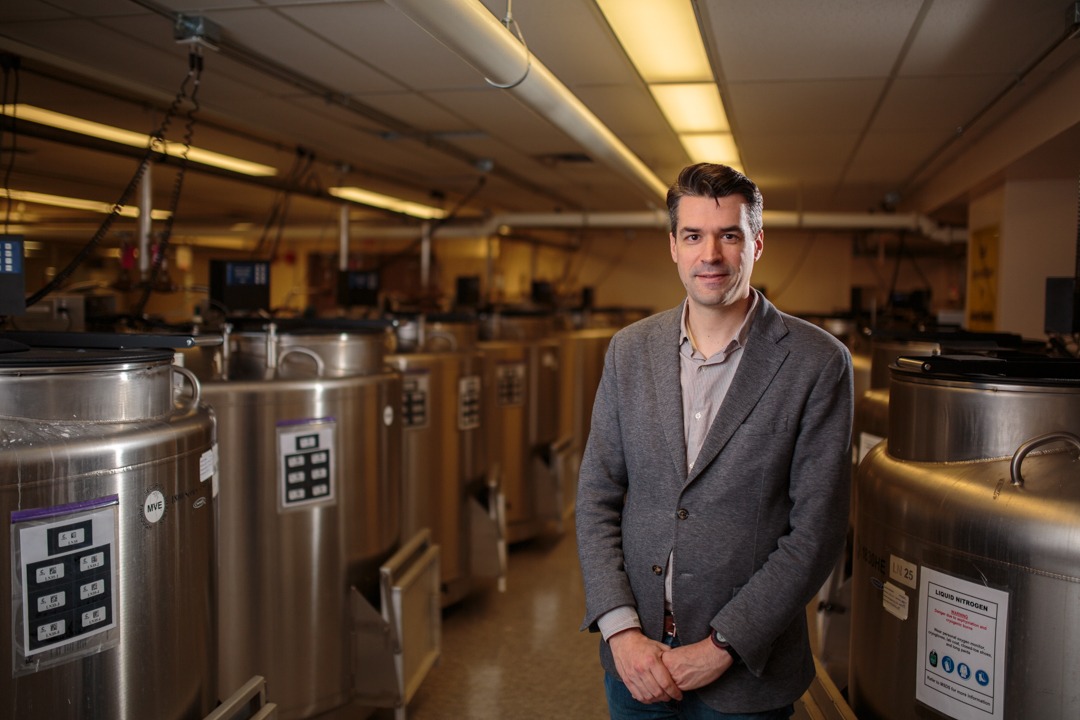
New clinical trial offers hope for reducing deaths from advanced HIV
Hamilton Health Sciences (HHS) hematologist and researcher Dr. John Eikelboom is co-leading a new clinical trial in sub-Saharan Africa that offers hope to thousands of people with advanced HIV.
Called REVIVE, the study is testing the low-cost antibiotic azithromycin in reducing deaths among 8,000 patients with advanced HIV who are starting or restarting antiretroviral therapy, a combination of drugs to treat advanced HIV.
The trial will span over 100 sites across a growing number of countries in Africa that so far include Botswana, Ethiopia, Ghana, Ivory Coast, Malawi, Nigeria, Republic of the Congo, Rwanda, Sierra Leone, South Africa, Tanzania, Uganda, and Zambia, with more to be added. More than 330 patients have already been enrolled at six sites across three countries.
“If azithromycin is shown to be effective, it will modify the standard of care for patients with advanced HIV.”
Funded by the Bill & Melinda Gates Foundation, the study involves a pan-African network of investigators, co-led by researchers at the Population Health Research Institute (PHRI), a joint institute of McMaster University and HHS, and the University of Cape Town in South Africa. It aims to determine whether azithromycin, when taken once daily over four weeks, can reduce death in adults with advanced HIV.
Eikelboom is the study’s co-principal investigator along with Dr. Sean Wasserman, who is based at St George’s, University of London, England and is an adjunct associate professor at the University of Cape Town.
Choosing a sabbatical in Africa
Four years ago, hematologist Dr. John Eikelboom was working in Hamilton, splitting his time between PHRI, where he’s a senior scientist, and HHS Hamilton General Hospital’s thrombosis clinic where he cares for patients.
When the pandemic struck in 2020, virtual meetings quickly dominated his work days. “I was going stir crazy, sitting in my office talking to screens,” recalls Eikelboom. That’s when he started mulling over the idea of taking a six-month sabbatical to somewhere in the world where infectious disease is prevalent, in order to study thrombosis, which happens when blood clots block the flow in veins and arteries. Studies have shown that infectious diseases are linked to thrombosis.
An earlier trial demonstrated that a package of enhanced preventative treatment, which includes five days of azithromycin, reduces mortality by 27 per cent.
After considering several international locations, he decided on South Africa where HIV is prevalent. Eikelboom had contacts at the University of Cape Town, and was given office space in the department of medicine where he was inspired to instead study advanced HIV treatment by South African colleagues including Wasserman.
Global partnership
“University of Cape Town researchers pointed out that the big research question in Africa was advanced HIV,” says Eikelboom, who became fascinated with the prospect of a large-scale study that would unite his South African colleagues’ expertise with his expertise in running large international trials through the PHRI.

Dr. Marc Jeschke, vice president of research and chief scientific officer for HHS
“This clinical trial is an example of the vitally important, leading-edge work that HHS researchers are involved in internationally through the PHRI,” says Dr. Marc Jeschke, vice president of research and chief scientific officer for HHS. “This trial has enormous potential to help many thousands of people suffering from advanced HIV.”
HIV-related illnesses cause an estimated 630,000 deaths each year globally, with the majority occurring in sub-Saharan Africa. “With HIV persisting as one of the top five causes of mortality in Africa, addressing this issue remains an urgent international priority,” says Eilkelboom.
The staggering number of people living with HIV in Africa – from early to advanced stages — hit home when Eikelboom first arrived in Cape Town. “When you walk around Cape Town and the university campus, every seventh person you meet has HIV. In South Africa alone, eight million people are HIV positive and across the continent, there’s an estimated 25 million people with HIV. It’s mind boggling, and it’s a huge burden to the health-care system.”
With HIV persisting as one of the top five causes of mortality in Africa, addressing this issue remains an urgent international priority, says Eilkelboom.
The dangers of HIV stigma
Despite the increased availability of antiretroviral therapy for individuals with HIV in Africa, many people start or resume treatment only after the disease has progressed to an advanced stage. Undetected bacterial infections are a leading contributor to high mortality, and broader antibiotic treatment could potentially save lives.
Eilkelboom compares late-stage HIV to advanced cancer. “People can barely function. Their bodies are ravaged by illness. But if they start antiretroviral therapy, and they can survive the first hazardous three months where their immune system is being reconstituted, they can do very well. Through therapy, they can be brought from death’s door to being vibrant, productive members of the community with a normal life expectancy.”
An earlier trial demonstrated that a package of enhanced preventative treatment, provided at the time antiretroviral therapy is started or restarted ― which includes five days of azithromycin ― reduces mortality by 27 per cent at 24 weeks among patients with advanced HIV in Africa.
“If azithromycin is shown to be effective, it will modify the standard of care for patients with advanced HIV in Africa,” says Wasserman. “The REVIVE trial aims to identify an effective and implementable public health strategy to reduce the unacceptably high early mortality experienced by people with advanced HIV and will establish a pan-African network for future research to improve care for this population.”
Given the safety and accessibility of azithromycin as a drug, plus a strong possibility that it may prevent early deaths, the World Health Organization has prioritized research for approaches to antibiotic therapy within a public health approach, and specifically, the independent effect of short-course azithromycin on mortality in patients with advanced HIV.



